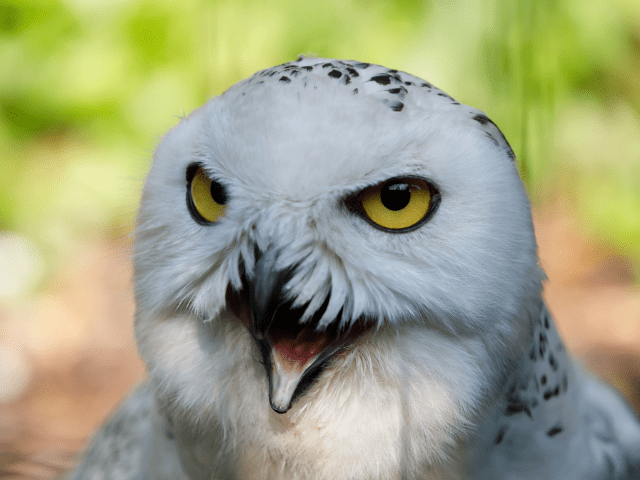Have you ever heard an owl hoot so much?
Compared to bird tweets and songs, owl hoots tend to be stronger and more high-pitched. They can either be beautiful or annoying to you.
But why are they hooting anyway?
Owls hoot for several reasons, and we’ve compiled all of those here in this article. We’ve got everything you need to know, from why do owls hoot to when they do so.
On the other hand, if you’re looking for what these hoots symbolize, we’ve got that prepped up for you too!
Allow us to tell you all about the hoots of these magical owls!
What Owl Hoots Are
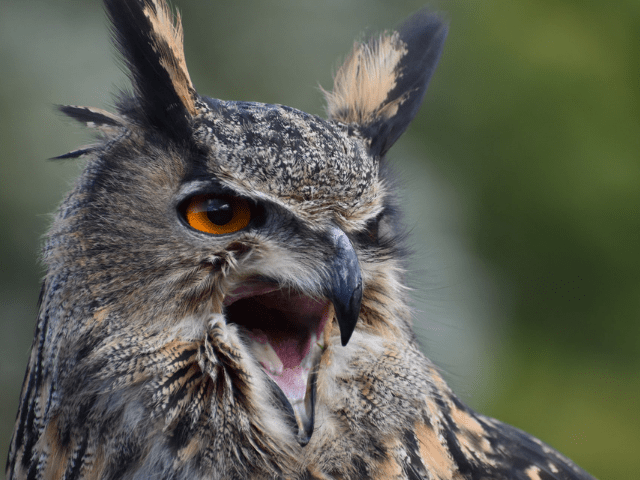
Owls are known to hoot to communicate and express themselves due to several reasons. Hoots are not emitted randomly; whenever an owl hoots, there is always an intention behind it.
These hoots contain individual variation that allows a male owl from certain species to identify whether it came from fellow owls that they know and those that they don't. Owls tend to react more aggressively upon hearing unfamiliar hoots.
Why Owls Hoot
Let's get to know what are the different types of owl calls. Below is a quick list of interesting owl calls and their meanings. You'd be wondering by then how the experts differentiate owl hoots, let alone give meanings to them! But before we get there, let me tickle your mind a li'l bit...
Do you know that a Eurasian eagle owl pair often hoot in a duet? Yes! And the male and the female have different pitches, too!
Defense Calls: Attacking A Predator Or Warning That A Predator Is Near
Like all other birds, owls, too, get attacked and invaded by predators, and they aren't so welcoming, either.
In the presence of a predator, owls may let out a loud continuous hoot or shriek to warn other birds and to scare off the predator. The only reason why owls would stop is if the predator has given up and left or proceeded with an attack.
Once the predator starts attacking, owls will begin to fight while hooting to express their anger and threaten the enemy.
Fear Calls: Being Threatened Or Surprised By Something
Owls are quiet creatures (except for when they're hooting). They don't sing or tweet like other birds, which is one reason why they're easily startled.
Aside from that, owls also release a hoot similar to a growl or a snarl whenever they feel very threatened by what's happening around them. Like if a loud noise or motion disturbs their sleep.
They also make some snapping noise with their beaks to fend off other birds around them, which to me is very cute!
Mating Calls: Courtship, Attracting A Mate, Or Communicating With One
Since owls use hooting as a way of communication, it is observable how much they communicate with each other for many days before mating; it’s like they're getting to know each other first.
Male owls tend to hoot more than female owls because they are trying to convince and attract. A classic example of it is the Northern hawk owl.
What's even more adorable is that even if they already have a mate, they still court each other!
Territorial Calls: Fending Off Intruders and Claiming Territory
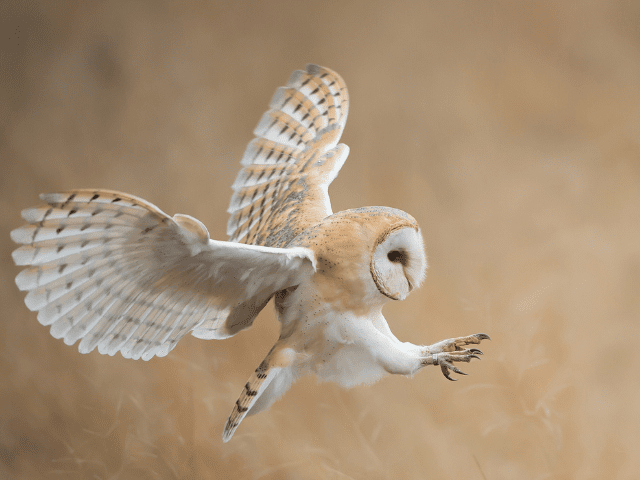
Aside from predators, other birds also attack owls to invade or steal their territory. And their territorial behavior is undefeatable that even great horned owls are known for their long, classic, and terrifying triple territorial call.
When male owls look for a nesting place, they let out a loud hoot to let every other bird around know they have claimed the area and are marking their territory. And this is precisely why they get so mad whenever another bird comes close.
When Owls Hoot
Daytime
One of the most common misconceptions when it comes to owls is that they are all nocturnal.
Owls hooting in the morning is nothing to be alarmed about, it's natural, and you may hear it often if you live in a place that's located close to diurnal owls like the burrowing owl.
However, not all owls hooting at night are nocturnal; some, like a barred owl and the barn owl, hoot in the day whenever the sky is not so bright. Barred owls are known to hoot, mimicking "who cooks for you," as they say. Can you imagine how annoying it is when a parliament of barred owls hoots all at the same time?
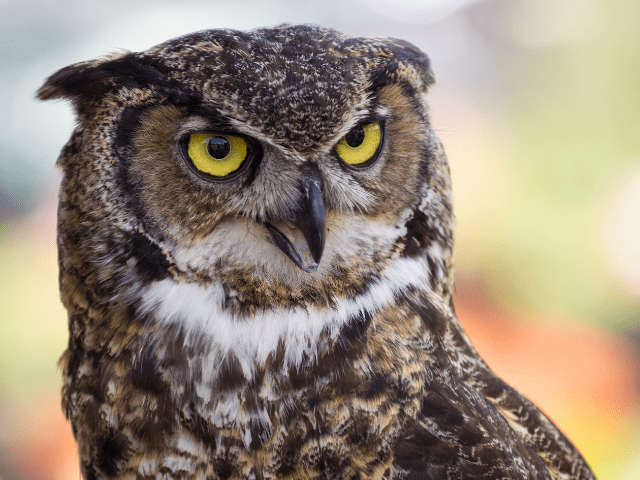
Nighttime
If your home is located in an area full of owls, you are most likely to hear them at night compared to during the day.
Owls that hoot at nighttime are most likely nocturnal owls, while those that aren't might have gotten disturbed, shocked, or surprised during their sleep either by natural causes or another bird that would either be a predator or an invader. Now, it goes without saying that not only a night owl hoots at night.
Mating And Nesting Season
During the mating season of October, a male owl begins to search for a safe, stable, and sustainable place to claim as territory and build a nest on.
These owls go back and forth collecting their materials, and it takes them days of work to build a big and safe nest for both the female owl and the eggs. Keep in mind that a female owl can lay up to FOURTEEN eggs at once, so just imagine how big the nest would be.
After building a nest, male owls actively search and attract female owls to their nest or communicate with their pre-existing mates.
This requires a lot of hooting since it is their form of communication, so take note that an owl’s hooting isn't always aggressive but sometimes romantic.
Watch this video of owl hooting during a mating season:
Once the mating is successful, they will breed their babies and lay and incubate their eggs. This most often occurs in the time of February or March.
So, why do owls hoot during these periods?
An owl hoot can be, at times, a fear or an attack call, as discussed earlier.
These periods are when the owls are most aware of their surroundings; they do anything to protect their offspring. They will pretty much not hesitate to attack anything that poses a danger to their home.
Whenever the eggs hatch and the juvenile owls begin to explore the world around them, much hooting can be expected as they communicate with each other along the way.
Before And During The New/Full Moon
Moon phases affect how active owls will be.
Magical, isn't it?
Some owls hoot most when the new moon is nearing, like the tawny owl, great horned owls, and barn owl. This is because it tends to be the darkest times.
On the other hand, some owl species, like the snowy owl, hoot the most whenever the moon is brightest, and that is, of course, during a full moon.
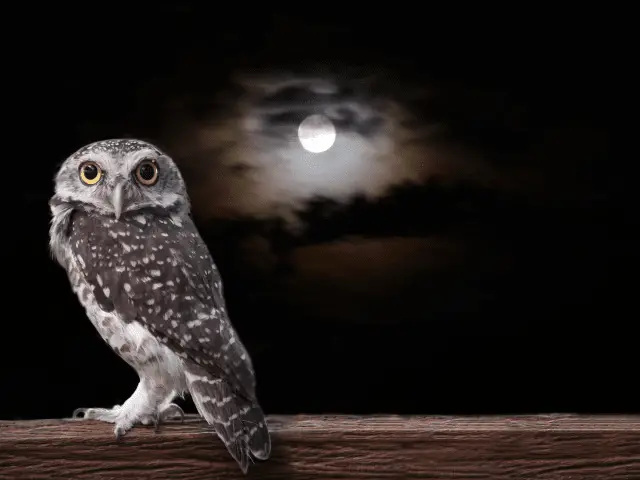
What An Owl Hoot Symbolizes
There are many things that owl hoots symbolize; it is up to you which one to believe in.
Fortune
Mythologically speaking, owl hoots are seen as symbols of fortune. Owls are keen and observant, which is why they are associated with the goddess of wisdom, Athena.
Misfortune
On the other hand, other cultures see owl hoots as misfortune, whether it's nearing death, a terrible event, or a curse of a horrible future.
Warning
Others also believe that when owls hoot at them, they need to establish energetic boundaries.
This is because owls are also seen as carriers of protective spiritual energy. It is a warning for you to pay more attention to the people around you.
Wisdom
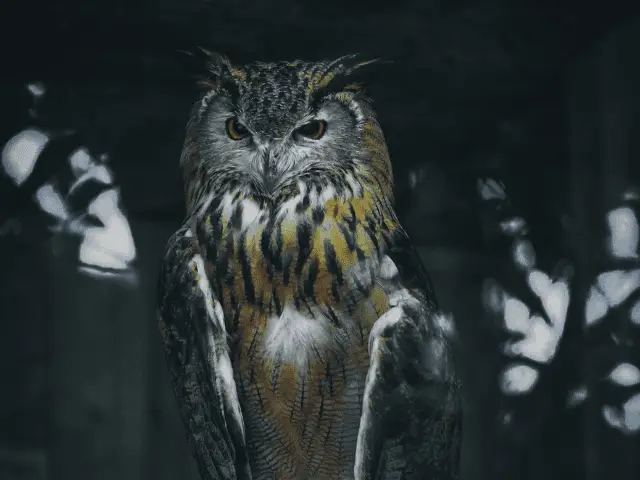
In Christianity, an owl’s hoot is a representation of a mystery behind the darkness; it is a vision of the unknown future.
Christians associate owl hoots with the wisdom we can learn from the darkness. Meaning to say, if you’re going through some dark times and you hear an owl hoot, it is time for you to focus on what you are learning during these times of your life.
An owl hoot may just be a reminder for you to re-evaluate the events in your life and how they affect your values.
Frequently Asked Questions
What Other Birds Make Sounds Like Hooting Owls?
If you ever find yourself hearing an owl's hoot that sounds a bit funny or strange, then you most likely hear a bird called a Mourning Dove. Mourning doves can be found almost everywhere. They are more abundant than owls, so there's a big chance that it's not an owl but a mourning dove that you hear instead.
What Does Hearing An Owl After Someone's Death Symbolize?
In some cultural beliefs, hearing an owl hoot, screech, or make loud noises after someone's death is believed to be a dire warning. An Eastern screech owl warning practically means that something terrible is about to happen in the coming hours.
On the other hand, since some believe that owls are messengers of death, hearing an owl after somebody's demise may mean being guided on their way to the afterlife. All meanings that have been stated below remain to be what they are, beliefs. So take what resonates and leave what doesn't 🙂
What Does It Mean To Hear A Hooting Owl At Night?
Culturally speaking, owls are symbols of magic and luck. However, encountering an owl hooting and screeching at nighttime is viewed as bad luck or even death for a newborn child.
Other cultures also believe that hearing a hooting owl on cold nights signals a storm, which makes sense a little bit. Factually speaking, owls hoot at night because it is the time of the day that they are most active (if they are not diurnal owls). They may just be communicating with other owls or other birds.
What Does It Mean To Hear An Owl Hooting In The Morning?
Owls are well known to be nocturnal and observant. They can often be heard hooting from late at night until early morning. Nocturnal owls hoot at night, but not all the owls hoot in the nighttime only the nocturnal ones.
However, if you hear an owl in the late morning, this may mean that they are trying to communicate its fear or bravery despite the predator or intruder in front of them. Other than that, some owls are active in the morning, unlike most owls (diurnal owls). So if you ever hear them, it just means that they are going on with their day-to-day lives.
Finishing Remarks
Owls hoot for many reasons, and we humans have our ways of depicting the meaning behind it.
If you ever encounter an event of a hooting owl that is believed to be a bad omen, it is your choice whether to accept it or not. You could always play it safe by staying positive and taking caution.
Whatever reason the owl may have for hooting and whatever it may symbolize, one thing is sure; that is that owls are beautiful and magical creatures that deserve all the love!
By the way, do baby owls hoot? I'll keep that question hanging for now. 😉

